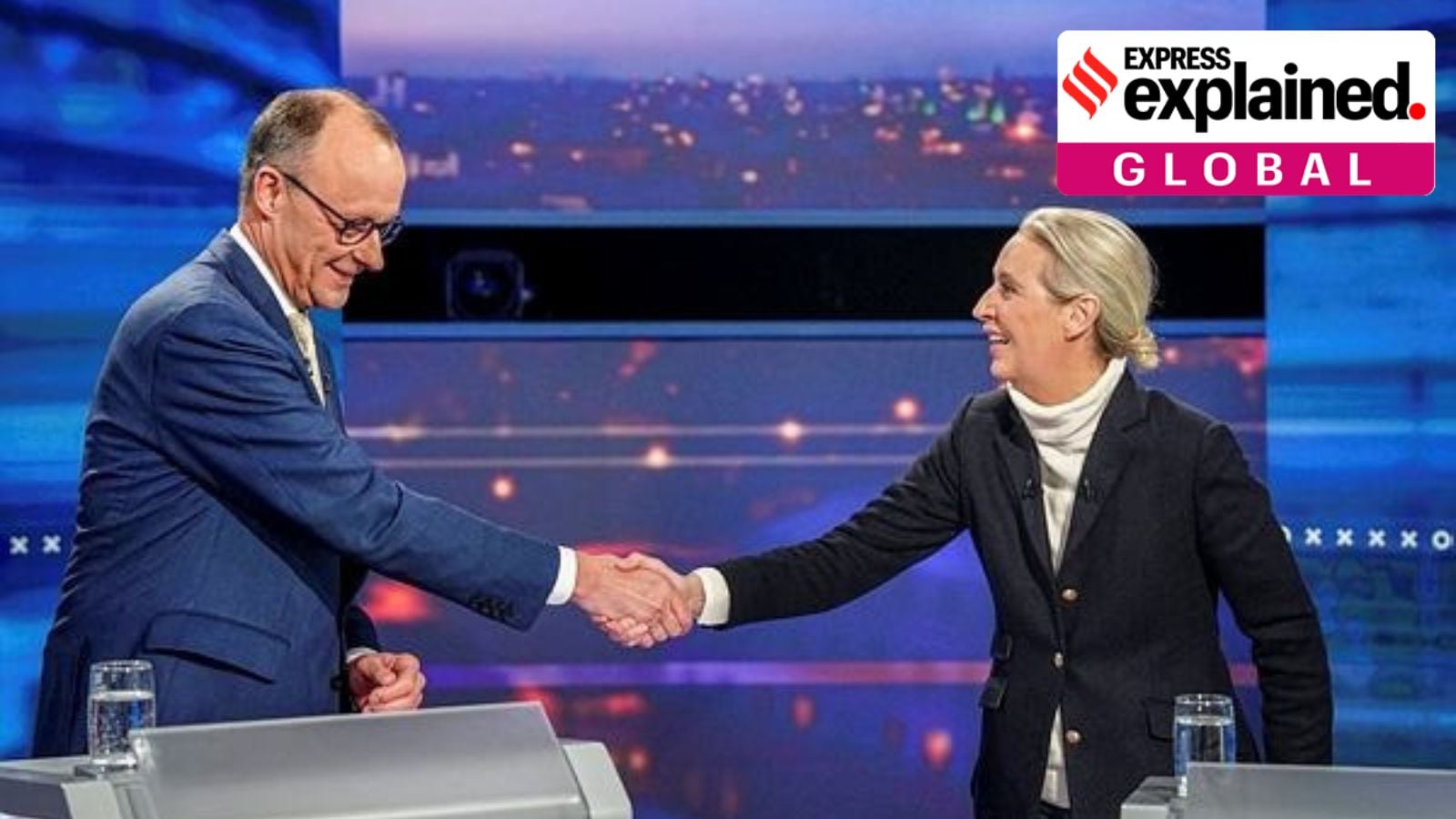What to know about Germany’s far-right, far-left parties that could upend the upcoming election
With a week left to Germany's snap polls to the parliament, both the AfD on the far-right and BSW on the far-left could offer a stiff challenge to mainstream political parties. Here is what to know.
 Christian Democratic Union (CDU) party leader and frontrunner to become Chancellor Friedrich Merz shakes hands with Alternative for Germany (AfD) party co-leader Alice Weidel before the RTL and NTV TV programme ‘Quadrell’ in Berlin, Germany, February 16, 2025. (Reuters)
Christian Democratic Union (CDU) party leader and frontrunner to become Chancellor Friedrich Merz shakes hands with Alternative for Germany (AfD) party co-leader Alice Weidel before the RTL and NTV TV programme ‘Quadrell’ in Berlin, Germany, February 16, 2025. (Reuters)US Vice President JD Vance criticised the organisers of the Munich Security Conference (MSC) on Friday (February 14) for barring entry to Germany’s far-right Electoral Alternative for Germany (AfD) and far-left Sahra Wagenknecht Alliance (BSW).
Referring to their exclusion, Vance said, “…we don’t have to agree with everything—or anything—that people say. But when political leaders represent an important constituency, it is incumbent upon us to at least participate in dialogue with them.”
MSC chair Christoph Heusgen had on February 3 justified this decision, referring to both parties walking out of Ukraine President Volodymyr Zelenskyy’s address to the German parliament last June. According to Heusgen, both AfD and BSW had rejected the summit’s core “Peace through dialogue” principle in doing so.
With elections to the German Bundestag (Parliament) scheduled for February 23, here is what to know about the two parties.
First, what to know about the upcoming polls
The parliamentary election on February 23 was necessitated by the implosion of the ruling traffic-light coalition, named after the party colours of the Social Democratic Party (SPD), the centre-left Greens Party and the economically liberal Free Democratic Party (FDP). The coalition was elected in 2021 and would have served a four-year term.
Prime Minister Olaf Scholz’s dismissal of FDP leader Christian Lindner as the finance minister, and the FDP’s exit from the coalition left it without a parliamentary majority in November 2024. The coalition lost a confidence vote in December, paving the way for polls on February 23.
The conservative Union parties (CDU/CSU) are the frontrunners to form a government, with 29.2% of the vote according to a Reuters poll on February 17. They are followed by the AfD which has gained 4.6% since June 2024, and stands at 21.3% currently. The BSW is currently polling at 4.5%.
AfD flanking the German far-right
In its original avatar, the party was called the Electoral Alternative 2013. It was founded by Bernd Lucke, Alexander Gauland, Frauke Petry and Konrad Adam, a Eurosceptic band of economists who protested the eurozone. The group opposed the then-German government’s decision to bail out poorer European countries from the Eurocrisis.
The party’s hard-right pivot in the following years, marked by anti-immigration and anti-Muslim rhetoric, helped it make electoral gains regionally by 2016. It successfully forayed into the Bundestag in 2017 with pronounced Islamophobic messaging, winning 94 of the 709 seats.
The AfD advocates for remigration, a controversial policy that implies the forced deportation of immigrants and their European-born descendants not deemed “ethnically” European by ethno-nationalists to the home countries of their ancestors. AfD is also the only German party to endorse climate change denial, seeing it as the third major policy issue after Euroscepticism and immigration.
Members of the party have previously expressed cynicism about the events of the Holocaust, with AfD leader in Thuringia, Björn Höcke in 2017 calling the Holocaust memorial in Berlin a “monument of shame” in German history.
The party was forced to issue a clarification after countrywide protests erupted following an investigation that revealed that some of its members had attended a secret meeting in Potsdam in November 2023 where remigration was discussed, and neo-Nazis were present. Political leaders, including Chancellor Scholz, drew parallels to similar plans made by the Nazis.
Today the AfD occupies a polarising status in Germany, with German domestic intelligence identifying the party as a “proven right-wing extremist group” in three eastern states. However, its reputation outside the country was boosted in January when Elon Musk hosted a live-streamed chat on social media platform X with party leader, Alice Weidel. The session, attended by about 200,000 X users, saw him praising her and endorsing the party for the upcoming election. Vance’s criticism of the MSC and his meeting with Weidel last Thursday indicates the US government’s tacit endorsement of the party as well.
BSW, the rookie at the far-left
The fledgling BSW was formed in January 2024 when far-left politician Sahra Wagenknecht and her supporters exited the post-communist era Left Party. The Left Party itself is the successor to the Socialist Unity Party (SED) which had ruled erstwhile East Germany between 1949 and 1989.
Explaining her decision to form a new party, Wagenknecht then blamed the electoral failures of the Left party over the last two decades for sidelining economic welfare while supposedly favouring an intersectional approach to social justice.
In the past, Wagenknecht has identified as a Communist and expressed nostalgia for the old German Democratic Republic (former East Germany), refusing to call it a dictatorship. According to a Politico profile of her, she endorses “left conservatism”, an ideology that combines fighting economic inequality with social policies that foster “traditions, stability and security.”
The BSW has positioned itself as a populist alternative to the AfD with its push for left-wing economic policies on subjects like job security and social justice. Political scientist Martin Elff described the party’s platform to Politico as a “unique combination of ideological elements … combining traditional left-wing positions regarding the economy and the welfare state with an unambiguous opposition to immigration.”
The party is currently part of the government in two east German states.
How will the AfD and BSW impact the upcoming election?
The current election is poised to be extremely polarising, coming amidst heightened anti-immigrant sentiment. In recent months, Germany has seen an uptick in attacks involving suspects who were asylum-seekers or immigrants.
Further, the election will likely highlight the divide between east Germany and the west. An analysis by Politico revealed that establishment parties like the SPD and CDU/CSU, rooted in west Germany, have yet to lay their roots in the post-communist regions. The lack of representation of east Germany in governments since the 1990s and the lower pace of economic development compared to their compatriots have also caused much indignation.
In the past, east German voters have changed political allegiances between elections, compared to the consistent voting patterns in the west and south of the country. This allows relative newcomers like the AfD and BSW an opportunity to expand their voter base. A Pew Research Center report from March 2024 indicated that one in five Germans see the party favourably.
Interestingly, both the AfD and BSW are campaigning on identical planks – Both parties want to stop arming Ukraine in its war against Russia and favour re-establishing relations with Russia to import gas. Both parties are Eurosceptic, oppose NATO influence, and endorse a crackdown on migration.
And both parties have already experienced electoral success in east Germany.
In September 2024, the AfD became the first ever far-right party after World War II to secure an electoral victory in the country’s regional elections. Given the country’s troubled history with Nazism, mainstream political parties have maintained a ‘firewall’, a tradition of allying to keep right-wing extremist parties from acquiring political power. Thus the AfD was effectively blocked from forming a government in Thuringia, even though it had won 33% of the vote, compared to the CDU at nearly 24%. In December, the BSW entered an alliance with the CDU and SPD, with the support of the Left Party, to form the government in the state.
With sections of the German public no longer baulking at a possible association with far-right elements and the AfD’s increasing popularity, it remains to be seen whether a firewall would be upheld in this election. The party could possibly emerge as a kingmaker in the coming election, or at the very least, be a thorn in the side of the following government.
While all other parties have ruled out allying with the AfD, an anti-immigration bill championed by CDU leader Friedrich Merz – the man tipped to become the next Chancellor – was narrowly passed with the support of the AfD in January. This marked a major break in the firewall policy.
- 01
- 02
- 03
- 04
- 05






































